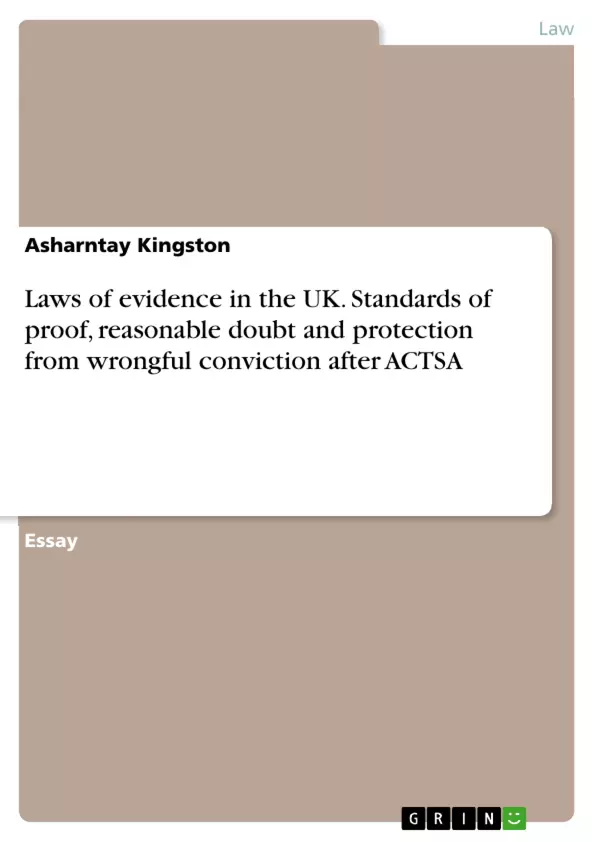This discussion will concentrate on the ‘cornerstone principles’ of the right to a fair trial, namely: the presumption of innocence and the standard of proof beyond reasonable doubt, in relation to prevention of wrongful conviction. It will be argued in accordance with Sundby that these procedural features undeniably benefit the accused in the usual criminal procedure, as they operate to prevent wrongful conviction.
However, despite the importance of these integral principles in criminal law, following the September 11th attacks on the Twin Towers, the presumed threat to national security was so significant that it was able to outweigh the importance of these principles and their function to protect accused persons from wrongful conviction. In counteracting terrorism, a ‘dual system’ of criminal justice developed under the Anti-terrorism, Crime and Security Act (2001), as suspects were presumed guilty and the standard of proof was altered. The modification of these principles reveal protection from wrongful conviction was outweighed by security concerns.
Table of Contents
- The Presumption of Innocence
- The Standard of Proof Beyond Reasonable Doubt
- The Anti-terrorism, Crime and Security Act (2001)
- The Prevention of Terrorism (Temporary Provisions) Act (1974)
Objectives and Key Themes
This discussion examines the cornerstone principles of the right to a fair trial, namely the presumption of innocence and the standard of proof beyond reasonable doubt, in relation to the prevention of wrongful conviction. It analyzes how these principles were modified in the context of the post-September 11th counter-terrorism measures in the United Kingdom.
- The importance of the presumption of innocence and the standard of proof beyond reasonable doubt in safeguarding the right to a fair trial.
- The impact of national security concerns on the application of these principles in the wake of the September 11th attacks.
- The development of a "dual system" of criminal justice under the Anti-terrorism, Crime and Security Act (2001), which altered the presumption of innocence and the standard of proof for suspected terrorists.
- The potential consequences of prioritizing national security over the protection of individual rights.
- The potential erosion of democratic principles and the transition to an arbitrary state when fundamental rights are compromised.
Chapter Summaries
- The Presumption of Innocence: This chapter examines the significance of the presumption of innocence as a foundational principle of criminal law. It explores the rationale behind this principle, its role in promoting due process, and the potential consequences of its erosion.
- The Standard of Proof Beyond Reasonable Doubt: This chapter discusses the importance of the standard of proof beyond reasonable doubt as a critical safeguard against wrongful convictions. It analyzes the high threshold required for proving guilt and its role in balancing the power between the state and the accused.
- The Anti-terrorism, Crime and Security Act (2001): This chapter focuses on the modifications to the presumption of innocence and the standard of proof introduced by the Anti-terrorism, Crime and Security Act (2001) in response to the threat of terrorism. It explores the rationale behind these changes, their impact on individual rights, and the legal challenges they faced.
- The Prevention of Terrorism (Temporary Provisions) Act (1974): This chapter examines the Prevention of Terrorism (Temporary Provisions) Act (1974) as a precedent for the suspension of the presumption of innocence and the alteration of the standard of proof in times of national security threats. It highlights the pattern of prioritizing security over individual rights in the face of perceived terrorist threats.
Keywords
The key themes and concepts explored in this discussion include the presumption of innocence, the standard of proof beyond reasonable doubt, the right to a fair trial, wrongful conviction, national security, counter-terrorism measures, the Anti-terrorism, Crime and Security Act (2001), the Prevention of Terrorism (Temporary Provisions) Act (1974), and the potential for the erosion of democratic principles in the face of perceived threats.
Frequently Asked Questions
What are the "cornerstone principles" of a fair trial discussed here?
The principles are the presumption of innocence and the standard of proof beyond reasonable doubt, both essential for preventing wrongful convictions.
How did the September 11th attacks impact UK criminal law?
Security concerns began to outweigh individual rights, leading to modifications of fundamental legal principles for terror suspects.
What is the Anti-terrorism, Crime and Security Act (2001)?
It is legislation that created a "dual system" of justice where suspects could be presumed guilty and the standard of proof was altered.
Does the standard of proof "beyond reasonable doubt" still apply to all?
The discussion argues that under certain counter-terrorism measures, this standard was modified, potentially increasing the risk of wrongful conviction.
What is the danger of prioritizing security over fundamental rights?
The text suggests that compromising fundamental rights can lead to the erosion of democratic principles and a transition toward an arbitrary state.
- Quote paper
- Asharntay Kingston (Author), 2016, Laws of evidence in the UK. Standards of proof, reasonable doubt and protection from wrongful conviction after ACTSA, Munich, GRIN Verlag, https://www.grin.com/document/349881



